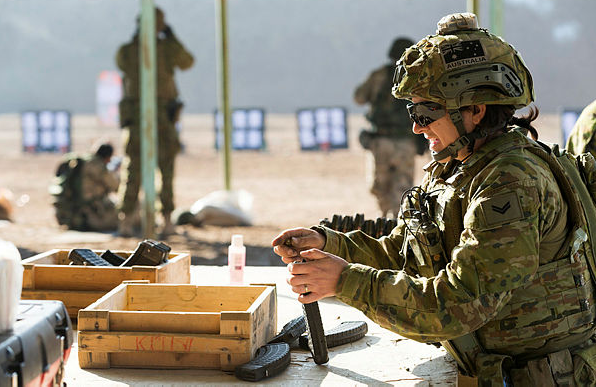
This article is the third in a series on ‘Women, Peace and Security’ that The Strategist will publish over coming weeks in recognition of International Women’s Day 2018. Eds.
Both of us entered politics to shape public policy and improve the lives of our community, our nation and, where possible, our world.
So, when research shows that peace lasts longer and conflict zones become more stable when the Women, Peace and Security (WPS) framework is implemented, we sit up, take notice and respond as leaders.
Since linking up a number of years ago to establish the bipartisan Parliamentary Friends of Defence, we’ve shared an interest in briefing our colleagues on the national security issues of the day, and highlighting the importance of inclusion to our defence capability and capacity.
Last year we hosted a roundtable discussion on the National Action Plan with a panel of experts. The discussion attracted considerable interest, even in the challenging, very busy final weeks of the parliamentary sitting period.
The event was such a success we will hold another roundtable in the first half of this year so that we can keep attention on the plan and explore any possible legislative gaps that need addressing in the next iteration. We’ll also move motions to highlight the benefits of a gendered perspective to our national security and seek to embed the plan’s principles in the platforms and policies of our parties.
National Action Plan updates are provided to Parliament, but only once every two years. If we’re to realise cultural change, we have to create a sense of urgency about the plan and its broader agenda, so we’ll request updates on an annual or twice-yearly basis.
And given the plan is critical to our national security and peace efforts, and as much about our defence capability and capacity as it is about gender, we’ll suggest that the Minister for Defence, Minister for Foreign Affairs and the Minister for Women jointly update the Parliament—with all three shadow ministers responding in the spirit of bipartisanship.
The Defence annual report, which is also tabled in Parliament, is reviewed each year by the Joint Standing Committee on Foreign Affairs, Defence and Trade Defence Sub-Committee. The latest report provides a broad overview of Defence’s commitment to the WPS agenda and an outline of some, but not all, of its actions. We will tease out the detail in the report review and discuss the option of a more fulsome account in future reports.
We’ll also recommend that all future parliamentary visits to operations include briefings on the plan—and where possible, tours of the programs. At the moment it seems any discussion is treated as an optional extra, usually reserved for female parliamentarians and usually only on request. Consideration should also be given to including a National Action Plan stream in the Parliamentary Exchange Program.
We appreciate that the National Action Plan 2012–2018 was the first of its kind in Australia, and that when it was introduced it was still early days for the WPS process. Naturally, the focus was on establishing the architecture and mechanisms for getting the agenda up and running, taken seriously and embedded across government.
Six years on, attention now needs to focus on the intent of the plan—to foster a business-as-usual gendered perspective.
The existing plan provides a comprehensive list of what it bills as outcomes—strategies, dialogues, training sessions, working groups, roundtables, exhibitions, courses and networks—all important and necessary. But these aren’t outcomes. They’re outputs.
What did all these actions achieve? What attitudinal and behavioural change did they realise? What benefit did they deliver to women, girls and boys?
For the WPS agenda to become business as usual, the next plan needs to include a clear statement of mission, a set of meaningful and measurable outcomes, and rigorous quantitative and qualitative data to have a clear picture of what has changed, particularly in defence capability and capacity.
As a start, we suggest a change of name for the next plan, so priority is less on action and more on tangible results.
In the lead up to 2019, we’ll work together and with our executives and colleagues to incorporate these suggestions into the next national action plan.
As friends and co-chairs of the Parliamentary Friends of Defence, we’ll also continue to advocate for a gendered perspective in conflict zones, peace transition and resolution, humanitarian assistance, and disaster relief.